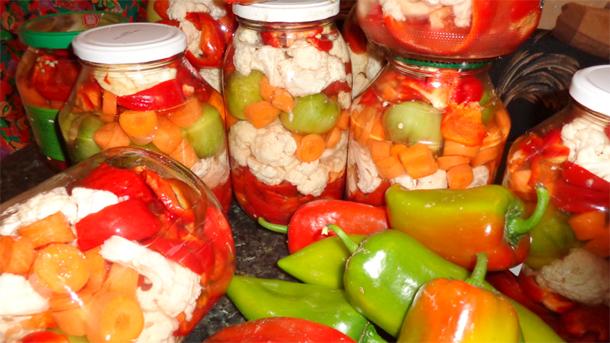As winter draws nearer, housewives in Bulgaria take to the kitchen for the solemn sacrament of the season – making preserves. Pickles, roast peppers, pickled gherkins, chutney, sauerkraut – for many Bulgarian households they are the principal source of winter-time vitamins, and the tradition of homemade preserves persists even though supermarkets are overflowing.
The Indian summer has brought throngs of people to the Women’s Market, but the mild weather is not the only explanation – it is preserve making season. Sofia’s biggest marketplace is called Women’s Market because it is the place where women used to come to buy everything they needed for the next portion of jams and pickles for the coming chilly days. And they still do. The stalls here look like a still life by a Dutch master: shiny orange pumpkins, glowing red peppers, crisp apples, butter-yellow pears, cauliflower, gherkins, plums and more. The nimble buyers view this cornucopia with a different eye – to them the fruit and vegetables are the stuff that will go into their preserves for the winter.
This is true of 68-year old Yordanka Miteva, who has been in charge of her household’s stock of preserves. She says that both of her grandchildren love her “work”.
 “We make everything ourselves – pickles, sauerkraut, everything. It is cheaper that way because it is homemade but it is also tastier because we suit them to our own taste. Chutney, jams – it is all my handiwork. I don’t trust the preserves in shops – five peppers inside a great big jar, and all the rest is water,” says Yordanka Miteva and takes a minute to stop at Trifon Naydenov’s stall. Trifon is 71, from Sofia and is selling fresh vegetables from his own garden in the outskirts of the capital city, but also homemade preserves, made by the women in his household using old recipes handed down in the family. Trifon says he has found a market niche:
“We make everything ourselves – pickles, sauerkraut, everything. It is cheaper that way because it is homemade but it is also tastier because we suit them to our own taste. Chutney, jams – it is all my handiwork. I don’t trust the preserves in shops – five peppers inside a great big jar, and all the rest is water,” says Yordanka Miteva and takes a minute to stop at Trifon Naydenov’s stall. Trifon is 71, from Sofia and is selling fresh vegetables from his own garden in the outskirts of the capital city, but also homemade preserves, made by the women in his household using old recipes handed down in the family. Trifon says he has found a market niche:
“Young people prefer to buy ready-made products, made using old recipes. They prefer them to having to make preserves themselves. There is a huge difference between homemade food and what you can get at the store. The products that go into the preserves in the shops are usually low quality. I grow vegetables myself and I only sell the best the market has to offer. And what matters most – I do it with a great deal of love!”
As all Southerners, we Bulgarians love good food and homemade preserves are part of our lives. And even though for many years pickles and compotes were thought to be a leftover form the dearth of socialist times, people seem to be reverting to this tradition. A tradition going back a long time, ethnographer Evgenya Toneva says. For years she has been studying Bulgarians and their attitude to homemade preserves and says that two thirds make their own pickles and jams. And adds that there is no difference between town and village, between people with university degrees and people with a low level of education, between young and old. Apparently, the tradition of homemade preserves is very much alive and kicking.
English version: Milena Daynova
In 2032, Bulgaria and Denmark will select their cities for the title of European Capital of Culture. The procedure will open in 2026 when the two countries will officially invite their cities to prepare their candidacies. The candidates must draw up..
The Eastern Rhodopes are one of the few places in Europe where the balance of nature has been restored almost to the state it was in two centuries ago. Here, ecosystems function naturally. In other words, animals and plants coexist in harmony without..
"I started working as a teacher in France, but I was bored. I started looking around – where could I go as a history and geography teacher? A vacancy appeared in Bulgaria." And so in 2007, Vincent Dupuy, a recent university graduate, set off for a..
The day of St. Tryphon is marked on 1 February old style (14 February new style), and i n the folklore calendar it spans 3 days, known as Trifontsi..
Priceless Romanian ancient gold stolen from a museum in the Netherlands Three golden bracelets and a priceless helmet from the Romanian exhibition..
More than 50 wine producers from Bulgaria and Greece are going to take part in the contest for best wine with which the two-fay wine festival will kick..

+359 2 9336 661
